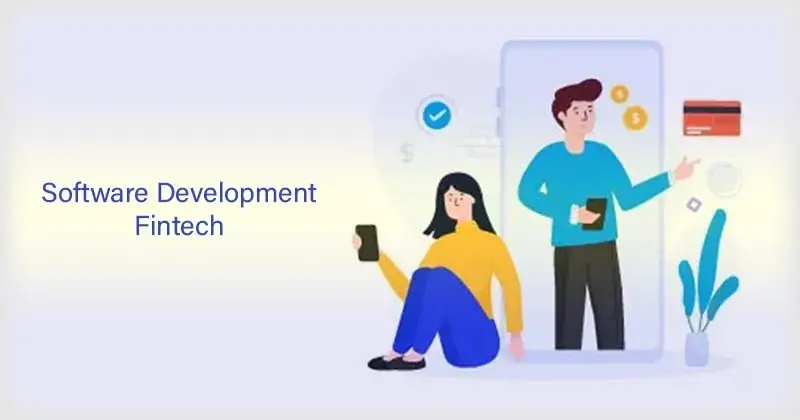The recent development in fintech has transformed the finance market. It has revolutionized how we conduct banking operations, invest, and manage our finances. In this whole transformation, software development has played a crucial role in empowering such innovative solutions that have become the face of the fintech industry.
Today, fintech software development services are driving unprecedented levels of accessibility, and efficiency from mobile banking apps to blockchain-based payment systems.
Therefore, understanding software development in fintech is paramount for several reasons. That is how you can comprehend the technological advancements reshaping the financial industry. It has enabled businesses and consumers to leverage cutting-edge solutions for their financial needs. That’s every mobile app development Houston is more inclined towards fintech products considering their growing demand in the finance market.
In this blog, we’ll delve into the complexities of software development in fintech. Here, we’ll uncover the distinctions that set it apart from traditional software development practices. Whether you’re a fintech entrepreneur, related to a software development company, or simply curious about the future of finance, this blog post will provide you with valuable insights into the dynamic world of fintech software development.
Understanding fintech
Fintech is based on a wide range of innovative solutions that leverage technology to improve and streamline various financial services. It includes different sectors such as online banking, mobile payments, peer-to-peer lending, robo-advisors, blockchain, and cryptocurrency.
Fintech solutions aim to enhance efficiency, accessibility, and convenience in financial transactions. As a result, they have revolutionized the traditional banking and financial processing methods.
Evolution of the fintech Industry
The fintech industry has experienced exponential growth and evolution over the past decade. In that span, it has been driven by multiple advancements in technology, considering the evolving consumer preferences.
Initially, fintech startups emerged as disruptors challenging traditional banking models with innovative solutions. These products were customized to specific financial needs, such as peer-to-peer lending platforms and digital wallets.
As the industry grew over time, established financial institutions began embracing fintech. Further, it led to collaborations and partnerships between banks and startups to deliver hybrid solutions.
Moreover, the rise of mobile technology, data analytics, artificial intelligence, and blockchain has further influenced the growth of fintech. As a result, it has enabled the development of innovative financial products and services.
Explaining of Software Development Process
Software development is a systematic process of designing, building, testing, and maintaining applications. It involves proper steps based on the user requirements to transform them into functional software solutions that meet specific objectives.
The software development process usually begins with gathering requirements from stakeholders. After that, designing the system architecture initiates which is further implemented by the code. Finally, the developers test the application for bugs and errors to deploy it on the relevant operating system.
However, the collaboration between developers, designers, testers, and stakeholders is crucial throughout the development process. That’s how you can ensure the quality, functionality, and usability of the software.
Key Stages of the Software Development Lifecycle
The software development lifecycle (SDLC) includes different stages through which a software project progresses from an idea to a complete product. The following are the key stages commonly found in the SDLC:
1- Requirements gathering
In this stage, stakeholders define the functional and non-functional requirements of the software. Here, they outline what the system should accomplish and how it should function.
2- System design
During this stage, software architects and designers create a high-level design of the system. It includes specifying its overall structure, components, interfaces, and data flow.
3- Implementation
In this stage, developers write the code according to the design specifications. It is based on programming of the requirements into executable software using suitable languages and development tools.
4- Testing
Testing is a critical stage where the software is evaluated to ensure it meets the specified requirements and functions. It includes unit testing, integration testing, system testing, and user acceptance testing to identify and further resolve any issues.
5- Deployment
Once the software has been thoroughly tested, it is deployed to the production for use by end-users. Deployment may involve installation, configuration, and migration of data, depending on the nature of the software.
6- Maintenance
The maintenance stage involves ongoing support and updates to the software to address bugs. It may include the implementation of new features, and adaptation to changes in user requirements. Maintenance ensures the software remains functional, secure, and relevant over its lifecycle.
Distinctions in fintech Software Development
Fintech applications are quite unique as compared to the regular software. Here are the following differences or unique points that keep fintech apps separate from regular mobile applications:
Regulatory compliance and security requirements
Fintech software development is subject to severe regulatory compliance standards. There are financial regulations such as Know Your Customer (KYC), Anti-Money Laundering (AML), and General Data Protection Regulation (GDPR).
To ensure compliance with these regulations requires thorough understanding and integration of legal requirements into the software design and development process.
Moreover, fintech applications must implement robust security measures to protect sensitive financial data and transactions. For that purpose, it integrates encryption, authentication, and access controls, to safeguard against cyber threats and data breaches.
Data privacy and protection measures
Data privacy is crucial in fintech software development due to the sensitive nature of financial information handled by these applications. Therefore, fintech developers must follow strict data protection measures.
That’s how they can ensure the confidentiality, integrity, and availability of user data. It includes implementing privacy by design principles, anonymizing personal data, and obtaining clear consent for data processing activities.
Additionally, compliance with data privacy regulations such as the GDPR and the California Consumer Privacy Act (CCPA) is essential to avoid legal liabilities and maintain trust with users.
Integration with financial systems and APIs
Fintech software often requires integration with various financial systems. It includes banking platforms, payment gateways, and trading exchanges, to access financial data and services.
This integration involves third-party APIs (Application Programming Interfaces) to exchange information and execute transactions securely. Therefore, fintech developers must navigate complex API ecosystems.
They must adhere to API documentation and standards. Further, you need to implement robust authentication and authorization mechanisms to ensure seamless and secure integration with financial systems.
Complexity of financial products and services
Fintech software development involves building top-notch financial products and services that cater to diverse customer needs and preferences. This complexity arises from the complexity of financial instruments, such as loans, investments and insurance.
Fintech developers must possess deep knowledge of financial markets, products, and regulations to design and develop solutions. That’s how their applications can meet regulatory requirements by addressing customer needs to deliver value to stakeholders.
User experience and interface design considerations
User experience (UX) and interface design are critical aspects of fintech software development. They directly impact the usability, accessibility, and adoption of financial applications.
So, fintech developers must prioritize intuitive navigation, responsive design, and seamless user interactions to enhance the overall user experience. Moreover, accessibility considerations, such as compliance with accessibility standards and support are essential to ensure usability for all users.
Additionally, fintech applications must provide clear and transparent information. For that purpose, you must offer concise financial reporting, and interactive features to empower users in making informed financial decisions.
The Bottom Line
Considering this blog, we can conclude that the evolution of fintech has redefined how we manage finances. Fintech applications, from mobile banking to blockchain systems, showcase unprecedented accessibility. Understanding fintech software development is crucial due to its distinctive features. It is essential to know the complexity in product offerings, and clear a focus on enhanced user experience. That’s how you can stand out in the market to have a valuable presence with your product.



